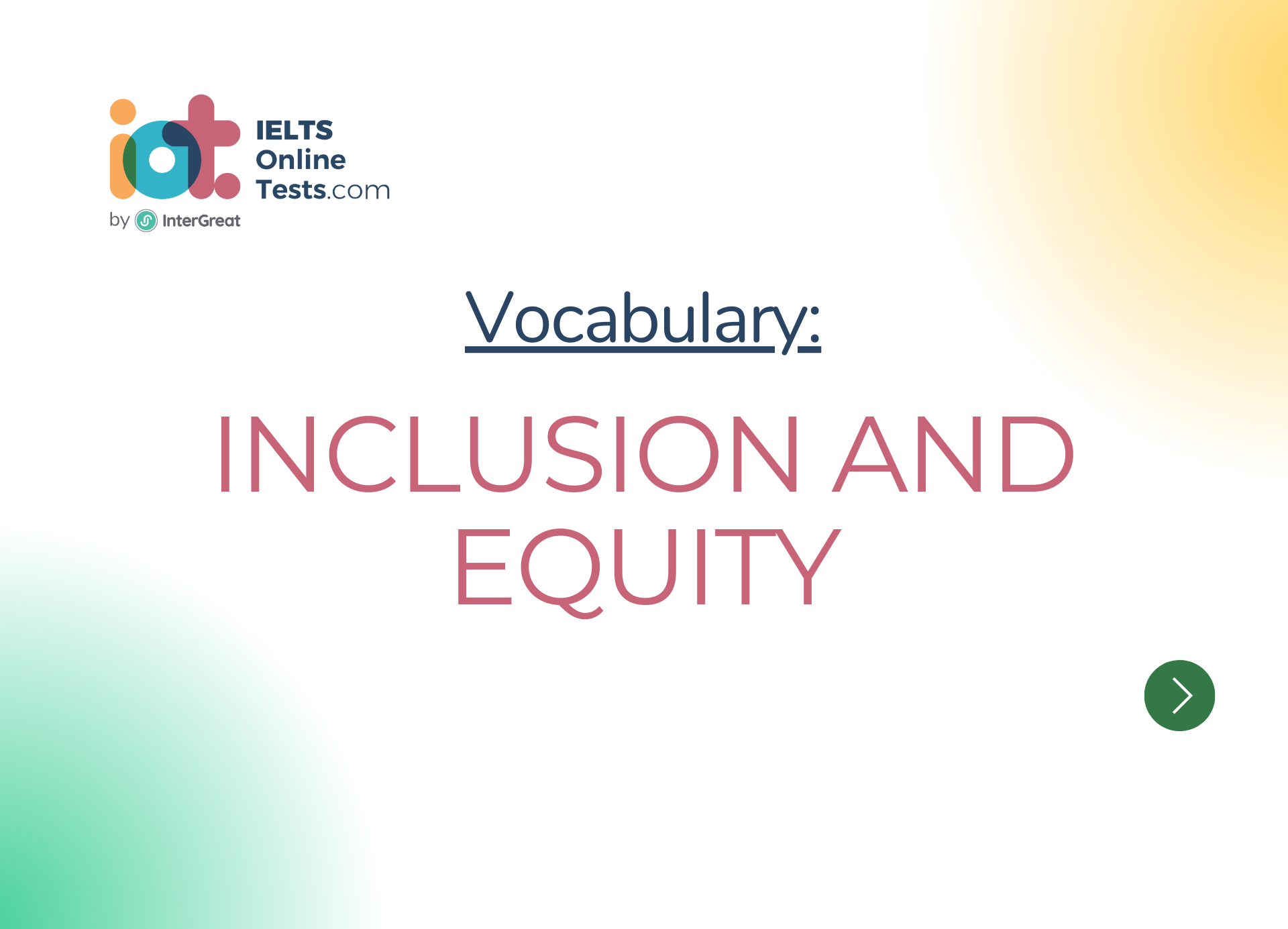
Inclusion and equity
Below is a detailed list of vocabulary related to inclusion and equity, along with their definitions. These words and phrases will help you discuss various aspects of promoting inclusivity and equality in society, demonstrating a strong understanding of the topic during the IELTS exam or any discussions about these important concepts.
Inclusion:
- Definition: The act of involving and valuing individuals from diverse backgrounds, ensuring their active participation and sense of belonging.
Equity:
- Definition: Fairness and justice in the distribution of resources, opportunities, and privileges to ensure equal outcomes for all individuals.
Diversity:
- Definition: The range of differences among individuals, including but not limited to race, ethnicity, gender, sexual orientation, disability, and age.
Equal Opportunities:
- Definition: Providing the same chances for personal and professional growth regardless of an individual's background or characteristics.
Social Justice:
- Definition: The pursuit of equality and the fair treatment of all members of society, particularly those who are disadvantaged or marginalized.
Inclusive Education:
- Definition: An approach to education that embraces the diversity of students and provides support to meet their unique needs.
Empowerment:
- Definition: The process of enabling individuals or communities to gain control over their lives and make informed decisions.
Access:
- Definition: The opportunity to use and benefit from resources, services, or opportunities.
Marginalized:
- Definition: Being treated as insignificant or peripheral within society, often due to factors such as race, gender, or socioeconomic status.
Intersectionality:
- Definition: The interconnected nature of social categorizations, such as race, gender, and class, that create overlapping and interdependent systems of discrimination or disadvantage.
Social Inequality:
- Definition: Disparities in wealth, opportunities, and privileges that exist among different social groups.
Affirmative Action:
- Definition: Policies or measures designed to address historical or current discrimination by providing special consideration or advantages to underrepresented groups.
Inclusive Language:
- Definition: Language that avoids exclusion and bias, promoting the involvement of all individuals and recognizing their identities.
Disparity:
- Definition: A significant difference or gap, especially in terms of access to resources or opportunities.
Barrier:
- Definition: An obstacle or impediment that hinders individuals from fully participating in various aspects of society.
Social Cohesion:
- Definition: The sense of belonging and cooperation among diverse members of society.
Inclusive Workplace:
- Definition: A work environment that respects and values the diversity of its employees and promotes equal opportunities.
Social Exclusion:
- Definition: The process of marginalizing certain groups from full participation in social, economic, and political life.
Equitable Representation:
- Definition: Ensuring that diverse groups are proportionally represented and have a voice in decision-making processes.
Inclusive Policies:
- Definition: Policies and practices that promote equal opportunities and access for all individuals, regardless of their background.
Systemic Discrimination:
- Definition: Discrimination that is embedded within the structures and institutions of society, leading to unequal treatment.
Inclusivity Training:
- Definition: Programs or workshops designed to educate individuals about the importance of inclusivity and equity.
Social Mobility:
- Definition: The ability of individuals or groups to move upward or downward in socioeconomic status based on their efforts and opportunities.
Inclusive Leadership:
- Definition: Leadership that fosters a sense of belonging and encourages diverse perspectives in decision-making.
Empathy:
- Definition: The ability to understand and share the feelings and experiences of others.
Cultural Competence:
- Definition: The ability to interact effectively with individuals from different cultural backgrounds.
Inclusive Community:
- Definition: A community that values diversity and ensures that all members are respected and included.
Implicit Bias:
- Definition: Unconscious attitudes and stereotypes that influence our perceptions and decisions about others.
Social Integration:
- Definition: The process of bringing together individuals from different backgrounds to interact and form cohesive social networks.
Inclusive Governance:
- Definition: The involvement of diverse stakeholders in decision-making processes and policy development.
Social Cohesion Programs:
- Definition: Initiatives or activities aimed at promoting unity and cooperation among diverse members of society.
Intersectional Analysis:
- Definition: The examination of how different social identities intersect and affect individuals' experiences and opportunities.
Equitable Development:
- Definition: Sustainable development that benefits all members of society and minimizes disparities.
Inclusive Growth:
- Definition: Economic growth that benefits all segments of the population and reduces poverty and inequality.
Social Responsibility:
- Definition: The duty of individuals and organizations to contribute positively to society and consider the impact of their actions on others.
As you study and use these vocabulary words, try to incorporate them into your speaking and writing to demonstrate a strong understanding of inclusion and equity during the IELTS exam or any discussions on these important topics.




